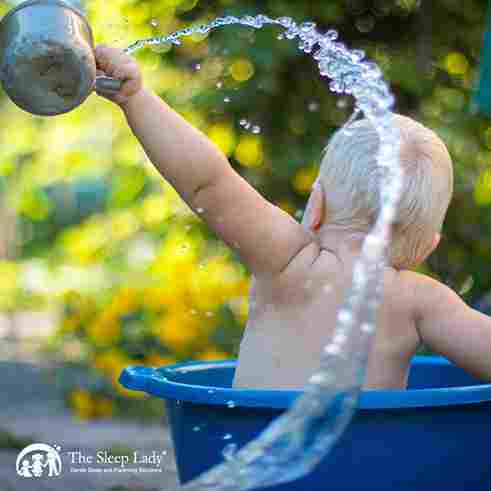Summer Sleep Tips: 10 Ways to Improve Summer Slumber
The days are getting longer, temperatures are rising, and summer is almost here. After rainy spring days, and a cold winter, the warmth is a welcome change. However, many parents don’t realize that this change may actually affect their baby’s summertime sleep. You already know how to handle the longer days. Vacation sleep sometimes veers a little off course — but can easily be corrected if you are careful to follow your child’s routine as closely as possible. But what happens when it gets hot? These summer sleep tips should help your little ones sleep in the heat.
1. Use a Fan
Did you know that the optimal temperature for sleep is between 68 and 72 degrees Fahrenheit? During the summer months, many of us have our air conditioners working overtime, but often, this may not be enough to help encourage sleep.
Even if you have air conditioning, often it doesn’t cool equally throughout the house. You can use a simple fan to help cool — or heat, if your baby’s room turns into an icebox when the air conditioner is on. Adjust the temperatures before bedtime so it’s already there. If your baby is mobile, consider putting a gate at the door, and placing the fan inside the room before bedtime to help cool it down.
2. Limit Bedding
When it gets warm outside, it’s best to remove blankets and other items that may cause your baby to overheat from the crib. If you have a toddler or preschooler who can’t sleep without their blanket or covers, consider a lightweight knit cotton blanket, or lowering the air conditioning a bit during sleeping hours to keep them comfortable.
Many of our little ones sleep on waterproof sheets, or with a waterproof barrier between the sheets and the mattress. These barriers may cause your baby to sleep warmer, so be sure that you’ve changed out winter flannels for cool cotton. Look for a breathable mattress pad to help her stay cool at night.
3. Think Twice About Pajamas
Full pajamas are adorable, but they may be too warm for summer. Consider looking for short pajamas, or allowing your little one to sleep in just a shirt and diaper. However, if you have an air conditioner that works overtime, you may want to put them in a short sleeve top and long pants. Use your best judgment, as every house cools differently.
4. Consider a white noise machine
With summer comes entertaining, and if you have neighbors who like to entertain, they may not remember that sound carries — or that your baby goes to bed at 7:30. The same applies to the older neighborhood kids who may have later bedtimes.
A white noise machine will help to cover the busy sounds outside, and encourage a soothing sleep environment. A ceiling fan on low can also provide just enough white noise to help your baby tune out what’s going on outside.
5. Avoid Sunlight Around Sleeping Hours
If longer days haven’t already affected your baby’s sleep patterns, the longer hours of light may begin to influence her circadian rhythm. Consider closing the blinds at least an hour before bedtime, and putting room-darkening shades or curtains in the nursery. Doing this will help your baby begin to relax and fall to sleep easier.
Did you know that sunlight actually prohibits your body’s production of melatonin? Try to remember sunglasses in the late afternoon, and spend some time inside, out of the sun, before bed. It actually takes a few hours for your body to build the optimal levels of melatonin required for restful sleep. Coming inside and having about 30-minutes of cool, quiet pre-sleep activities will also help your child to fall asleep easier.
6. Watch for Signs of Allergies
Many people don’t realize that summer can wreak havoc on those who suffer from allergies, and unfortunately, our children often don’t remember to tell us, or don’t realize that they have an itchy nose or watery eyes. The National Sleep Foundation has said that allergies can cause a lack of sleep. Additionally, a lack of sleep can make your little one more prone to allergy symptoms. It’s a vicious cycle, but there are a few things that you can do to help mitigate the amount of allergens your baby comes in contact with.
• Bathe your child more frequently. Even if you just have them quickly rinse off in the shower, the water will help remove traces of pollen from their skin and hair, and help to keep it from being tracked into their bed.
• Keep your windows closed when it’s breezy out, or use an air purifier to help pull the pollen out of the air.
• Vacuum regularly, dust, and change out sheets at least once a week to help keep the pollen in your home to a minimum.
If you suspect that your child is suffering from allergies, please see your pediatrician.
7. Limit Activities
I know that it’s incredibly tempting to fit as much into summer as possible, but children have a difficult time settling down when they have a packed schedule during the day. Try to limit activities, time in the car, and allow down time.
The same holds true for summertime naps. It’s important to keep your baby’s schedule as normal as possible, so be sure that you are still getting him down for naps at the normal time as much as possible, even if you’re on vacation.
8. Stay Hydrated
Allergies aren’t the only summer culprit guilty of stealing sleep. When you’re dehydrated, it can be difficult to relax because dehydration can lead to reduction in melatonin, which affects your sleep. Although most people associate tiredness and exhaustion with dehydration, a lack of proper melatonin production makes it that much more difficult to fall asleep.
Every parent knows that an overtired baby is no fun at all, and can be a challenge at bedtime. To prevent this, be sure that your baby is getting plenty of fluids, specifically water. Sugary drinks and caffeine — which is a diuretic — can actually make the situation worse.
9. Expect that Bedtime Might Change
Days are longer and nights are shorter during the summer. I would encourage you to stick to your baby’s flexible schedule as much as possible, but if you find that you’ve slipped, that’s okay. You can get back on track. Often, parents find themselves putting their baby to bed a bit later, which isn’t ideal. To get back on track, consider using some of the sleep-adjustment techniques for Daylight Saving Time.
10. Get Lots of Fresh Air
Fresh air can actually help your baby sleep. Plan to spend time outside, running, jumping, playing, splashing in the pool, or simply walking every day. Be sure to provide lots of hydrating fruits and water to ensure that your baby doesn’t get dehydrated. A UV protective hat will help to keep her cool as well. If you find that your child is getting red, remind her to sit down, drink some water, and rest for a few minutes.
Try to ensure that you schedule your outdoor activities earlier in the day to ensure that outdoor playtime doesn’t interfere with your baby’s sleep.





